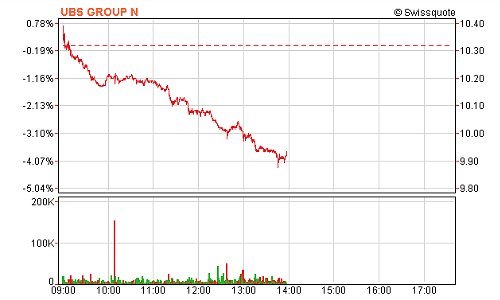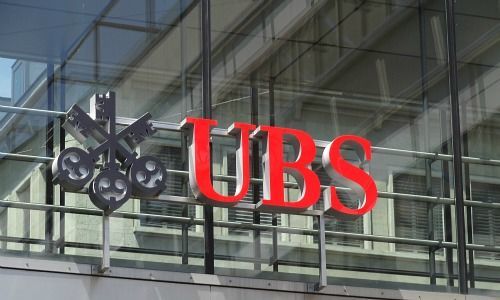UBS Crashes Under 10 Swiss Francs
Switzerland’s biggest bank is on solid footing, highly profitable, and pays rich dividends – yet its stock fell to a seven-year low. What’s going on?
At 1 p.m. CET on Wednesday, UBS’ stock breached the psychologically critical level of 10 Swiss francs. The Swiss giant’s stock was last this feeble in July 2012, and before that early in 2009. The all-time low of UBS – the world’s largest wealth manager – is 8.20 francs.

2009 represented the biggest crisis in UBS’ history, while in 2012 the bank was believed to need more capital (it didn't, but embarked on a major overhaul on its strategy, which was wrapped up by 2017).
Solid Results
Fast-forward to the third quarter of 2019: UBS is solidly capitalized, isn't under any existential threat to revenue and profits like Deutsche Bank. And yet, UBS seems under attack – there is little other explanation for Wednesday's tumble (at 16:23 CET, the stock traded 4.2 percent lower at 9.88 francs).
The normally well-informed «Cash Insider» (in German) reported on Tuesday that the bank is in the crosshairs of short-sellers, citing dealing room sources. The reasons aren't entirely clear: short-selling hedge funds, for example, wouldn't typically need an especially fundamental reason for a bet on falling stocks.
Sum of Unfavorable Parts
A quick analysis would show that UBS' stock price hasn't done well for some time, as finews.com reported last week. The reasons for UBS' stock languishing are manifold; in their sum, investors don't seem to trust UBS to hoist the share price anymore.
Most pressingly, a French court decision presents a huge financial and reputational risk to UBS, a major mortgage-selling investigation in the U.S. is ongoing, and the bank may face potential tax spats in other countries as well. All three represent deeper wounds, and not mere pinpricks, in the scheme of financial markets.
Weakness Apparent
A deeper look reveals that UBS isn't doing so well at its flagship wealth unit, as finews.com wrote last month. The merger 19 months ago of a U.S. brokerage unit and a wider private bank hasn't born discernible fruit. CEO Sergio Ermotti has thus far shied away from defining specific targets for spending cuts or profits as a result of the merger. The unit's margins are eroding and growth is proving hard to find.
CEO Ermotti and his 11-person management bear a share of the blame: there is little momentum or innovation visible from the outside. Wealth management co-head Martin Blessing appears ill at ease in his second role in three years, while Swiss boss Axel Lehmann looks aimless (the domestic business's dirty secret is that it practically runs itself). Chief lawyer Markus Diethelm is vulnerable after several setbacks, including in the key French criminal trial.
Lame Duck CEO?
Ermotti, who soon enters his ninth year leading the bank, stabilized UBS following a series of scandals. Of late, this commendable achievement has given way to his aversion to larger (and riskier) strategic moves.
The notable exception was his 13 million francs ($13.4 million) personal purchase last year of UBS shares (he has lost roughly $3 million on the investment since then). His time as CEO is running short – but UBS doesn't have a successor or natural succession plan in place. All of this speaks against buying UBS stock, and investors are making it clear.



























